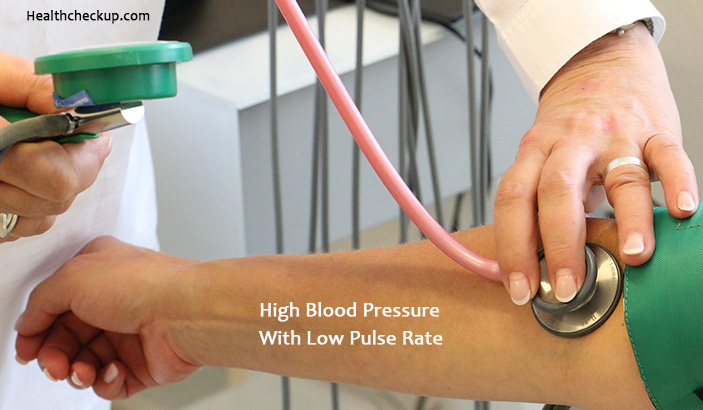The lifestyle changes and unhealthy food habits have increased the number of people with high blood pressure with low pulse rate, a condition in which the blood puts increased pressure on the blood vessels but still, the heart rate is less than 60 times a minute. To understand why this situation arises we need to understand the basics of blood pressure.
What Is High Blood Pressure?
High blood pressure (HBP) or hypertension occurs when the blood pressure goes up to harmful levels. The blood pressure measurement counts how much blood passes through the blood vessels and also the degree of confrontation it meets up while the heart pumps.
Blood pressure doesn’t pop up all at once and is the condition that happens over time. The narrower the arteries are the harder it is for the heart to pump the blood and based on this condition, the severity of hypertension prevails.
The normal pulse rate or the normal resting heart rate for anyone aged above 10 is between 60 to 100 beats per minute (bpm).
Difference Between Blood Pressure And Pulse Rate
Both blood pressure and pulse rate indicate the heart condition but are different from each other. Blood pressure is the force with which the blood moves through the blood vessels whilst the pulse rate is the number of times the heartbeats per minute. The former defines the blood movement while the latter defines the heart rate.
What Does High Blood Pressure With Low Pulse Rate Indicate?
A high blood pressure with low pulse rate can usually occur when someone is on medication for hypertension, however; this need not be the case always and can at times signal unattended hypertension or a grave injury or untreated high blood pressure. The condition can as well be a precursor to heart ailments and artery related complications. Remember that the heart rate and blood pressure relationship is direct and interlinked. Any differences in either heart rate or blood pressure can alter heart rate and blood pressure normalcy.
All in all, as a matter of precaution, consult your healthcare provider as he is the perfect one to let you know if everything is fine or something is wrong based on your past health condition and medical history.
What Causes A Low Pulse Rate With High Blood Pressure?
The causes are many, right from lifestyle to eating habits and from past family’s health history to nature of work. The other causes include;
- Thickened heart tissues which arise due to long term high blood pressure
- Medications especially beta-blockers used to treat high blood pressure
- Internal bleeding
- Traumatic injuries near the brain
All these are potential risk factors that can onset High Blood pressure.
Symptoms Of High Blood Pressure Low Pulse Rate
The symptoms are manifold and the first sign of caution is difficulty in breathing. Besides this, if you notice the below conditions then seek medical advice or consult your doctor without any delay.
- Lightheadedness or dizziness
- Fainting or almost fainting
- Shortness of breathing or difficulty in breathing
- Pain the chest region
- Confusion
- Difficulty in exercising
- Fatigue
- Weakness every now and then
These are the general signs & symptoms of low pulse rate with high blood pressure.
When To Worry About High Blood Pressure With Low Pulse Rate?
Usually, this shouldn’t be a worry if you follow healthy habits and stick to medicines if any were prescribed. However, it becomes a concern when you suddenly faint, feel dizziness, go through shortness in breathing, and feel sudden pains in the chest. These indicate immediate hospitalization and probably a pacemaker to cure the underlying reason that triggered these problems.
To sum up the thing, the above conditions may come every now and then if you’re on medication but if they come without you being on medication then it is a matter of worry. Keep your blood pressure and heart rate calculator handy if you’re a High blood pressure (HBP) person irrespective of you being on medicine or not.
Treatment For High Blood Pressure With Low Pulse Rate
Since this is such a condition that rarely goes away once affected it is better to depend on natural remedies and other alternative medicines rather than depending on allopathic medicines. Regular exercising, maintaining a good weight, a diet with less salt, not smoking, and moderate drinking will help a lot.
However, consult your doctor to know if you need medicines and other treatments.
Usually, Thiazide diuretics, Angiotensin-converting enzyme (ACE) inhibitors, Angiotensin II receptor blockers (ARBs), and Calcium channel blockers are suggested.
High blood pressure with a low pulse rate has become a common guest like diabetes. However, as long as you’re taking proper medicine and following good life habits there is nothing to worry about.

Sudheendra is a passionate blogger for 8 years and holds a Degree in Journalism & Mass Communications. His writings particularly focus on health, medicine, diet & lifestyle. For him, everything that interlinks and relates to health & medical world entices him. His write-ups aim at educating people not by just giving facts but by infusing human touch.









